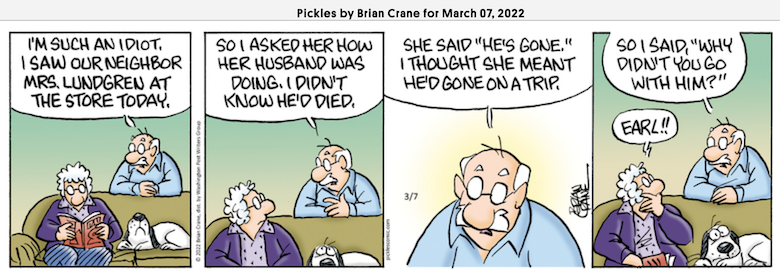It is a curious feature of people that many do not like to use the word ‘dead’ to describe the end of life of their loved ones and resort to various euphemisms, such as ‘passed away’. It may be something that will slowly go away as people get used to the idea of speaking about death more matter-of-factly and not as a taboo subject to be avoided.
People’s attitudes change. I remember an uncle of mine saying that he did not like people using the word ‘pregnant’ and preferred that they say that someone is ‘expecting’. And he was a doctor! Nowadays if you say someone is ‘expecting’ you are likely to get the puzzled query, “Expecting what?”
But the confusion that euphemisms can cause does lend itself to much humor as in this comic strip.
(Pickles)


https://youtu.be/IxzNEMnzmeg
Gone to Boot Hill. Your clock ran out. Went out of business.
Anybody remember Bugs Bunny and Elmer Fudd?
And finish on a song: Chris de Burgh’s “Don’t Pay The Ferryman”
This has been a pet peeve of mine for many years. My parents and father-in-law are dead, or maybe deceased, but you wouldn’t know it to listen to the people who talk about it. It doesn’t make any of them any less dead to say that they passed away, and you don’t actually know that they’re “in the arms of Jesus” or “called home by God” or any other religious phrase. When my mom-in-law talks about my dad-in-law being gone, or my cousins say the same thing about my parents or theirs, it isn’t all that bad in context, but not great.
“Passed away” in particular irritates me because I have digestive system issues, and associate “passing” with a toilet-related activity.
When my brain dies, I want people to say, in their best Bones McCoy voice, “She’s dead, [Jim]!” No waffling, please.
@3, I agree. My mother never spoke about her opinion of “passed”, but the look on her face--a struggle to conceal her pained expression--whenever anyone said it was enough.
I was firmly trained to say “died”, and have an aversion to “passed” that was just from watching her reaction.
Maybe it is consideration for the people who have lost their loved ones. Dead is a horrible and final word to somebody who would do anything to erase that loss. It just hurts too much, and emotions are not based in logic.
“Passed away” implies that the deceased have moved to another location. As a person without belief in the afterlife I cannot sincerely use the term.
Far worse though is the term ‘lost’ when describing the death of a loved one.
For example, if I were to say, “I lost my father in 2002” I would not be upset if I were then asked “Well, where was he when you last saw him?”
My brother has been mostly bald since his early 30s. His young son one day asked him “What happened to your hair, dad?” To which he replied “I lost it, son”.
The response was immediate. “Do you think you will find it again, dad?”
People have been dying for a long time. One day we might get used to it.
‘E’s not pinin’! ‘E’s passed on! This parrot is no more! He has ceased to be! ‘E’s expired and gone to meet ‘is maker! ‘E’s a stiff! Bereft of life, ‘e rests in peace! If you hadn’t nailed ‘im to the perch ‘e’d be pushing up the daisies! ‘Is metabolic processes are now ‘istory! ‘E’s off the twig! ‘E’s kicked the bucket, ‘e’s shuffled off ‘is mortal coil, run down the curtain and joined the bleedin’ choir invisible!! THIS IS AN EX-PARROT!!
At least according to the Sir Richard Burton translation of The Arabian Nights, the traditional Middle Eastern version of “And they lived happily ever after” came out something like, “Then they lived together until came to them the Destroyer of Delights and Sunderer of Society.”
Might have caused some interesting questions, at least the first or second time of hearing it (NB: few if any today would consider those stories suitable for children).
@7 larpar:
Recently in a joking mood I made reference to the “choir invisible”, and it occurred to me that this must be a well-known expression of some sort, not original with Python. So, still lighthearted, with help from Google I surfed on over to:
https://www.thereader.org.uk/featured-poem-o-may-i-join-the-choir-invisible-by-george-eliot/
which hit me like a ton of bricks. I had not even known that George Eliot wrote poetry.
Such power. And from a freethinker, which seems appropriate to mention here.
@ 3 rockwhisperer
In my part of Canada it seems to be “She passed”.
I passed too and that Chemistry class was nasty.
One possible long term trend is indeed that people will start saying ‘died’ explicitly. An alternative possibility is that one of the euphemisms may come to mean ‘died’ and will no longer be used for the original meaning. A word that in modern Hebrew is only ever used to refer to someone dying, in late antiquity meant ‘departed’ as in ‘said their good-byes and went away’.
IMHO that habit comes from old animistic beliefs. If you name an evil, it will come.
But an expecting mother is a different thing. A pregnant woman has had SEX. And civilized people don’t even think about sex.
Lassi Hippeläinen @ # 12: If you name an evil, it will come. … civilized people don’t even think about sex.
Funny, a lot of people who talk incessantly about sex don’t seem to get much…